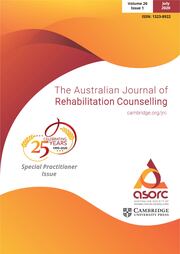No CrossRef data available.
Article contents
Response to Gregory C. Murphy: Criterion Problems in Rehabilitation Outcome Research
Published online by Cambridge University Press: 23 February 2012
Extract
I agree with Murphy that the title of our article is ambitious and we have not covered many aspects of recovery. The losses attributed to repetitive strain injury (RSI) are numerous and variable and are experienced not just by the person in pain but by friends, family, work colleagues and insurance companies to name a few. Measuring recovery from these losses is very complex. In our study we have chosen to focus on only two areas of recovery — decrease in pain and increase in function. In doing so, we have not defined recovery specifically in the title and we have implied, although not explicitly stated, our definition throughout the text. We are glad of the opportunity to clarify this here.
Our definition of recovery depends on context and client. If we work in educating counsellors we may believe that observable behaviours are important indicators of recovery. I work with people in chronic pain and for most of them decrease in pain and increase in function are the most important indicators of recovery. As these changes take place, other changes follow. For example, their mood improves and they can assume normal role responsibilities (or redefined role responsibilities). If, however, they assume normal role responsibilities without increase in function and decrease in pain, the behaviour is often not sustainable long term and more losses are incurred. If we choose to measure recovery from the perspective of the person in pain it seems reasonable to use a questionnaire that measures improvements from that perspective. We cannot assume that the observations of counsellors are more objective, comprehensive, reliable or valid than the person with RSI, particularly in view of the fact that the person with RSI lives with the condition 24 hours a day, seven days a week.
- Type
- Articles
- Information
- The Australian Journal of Rehabilitation Counselling , Volume 11 , Issue 1 , January 2005 , pp. 42 - 43
- Copyright
- Copyright © Cambridge University Press 2005


